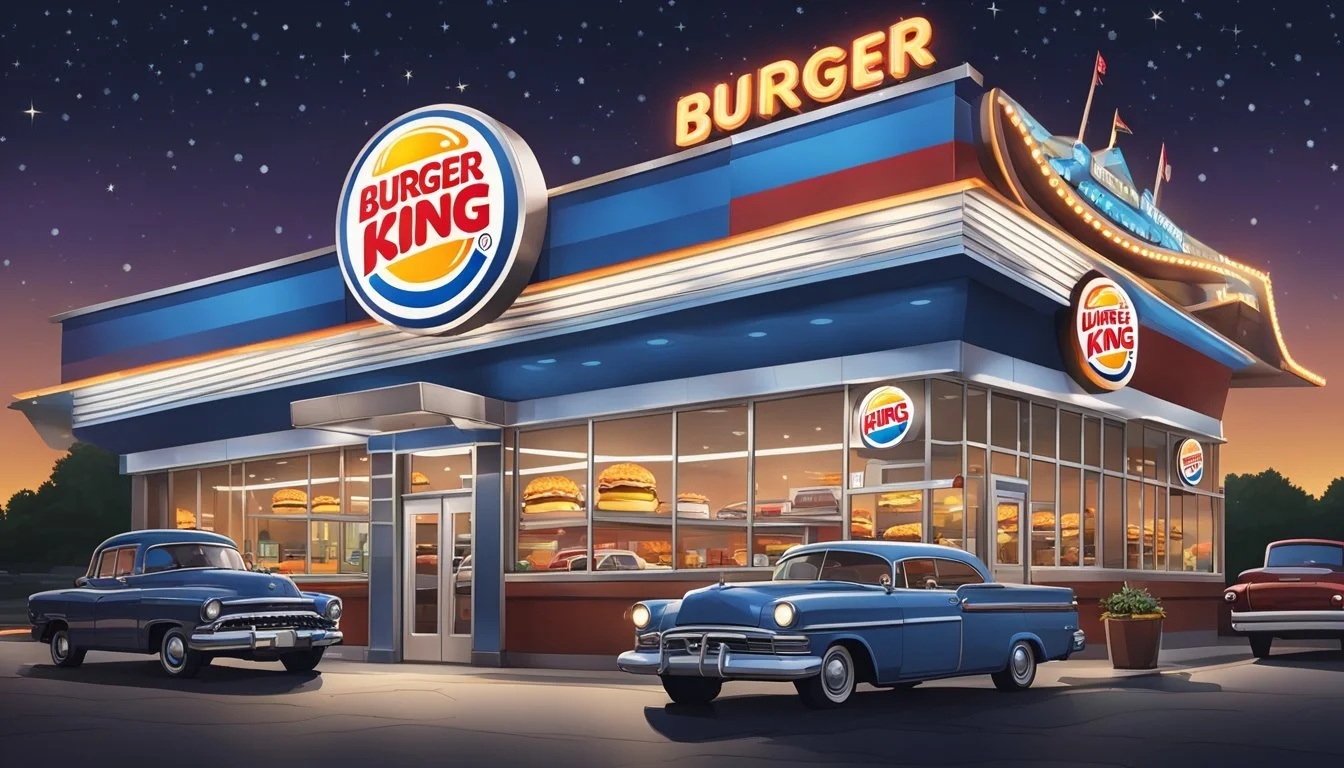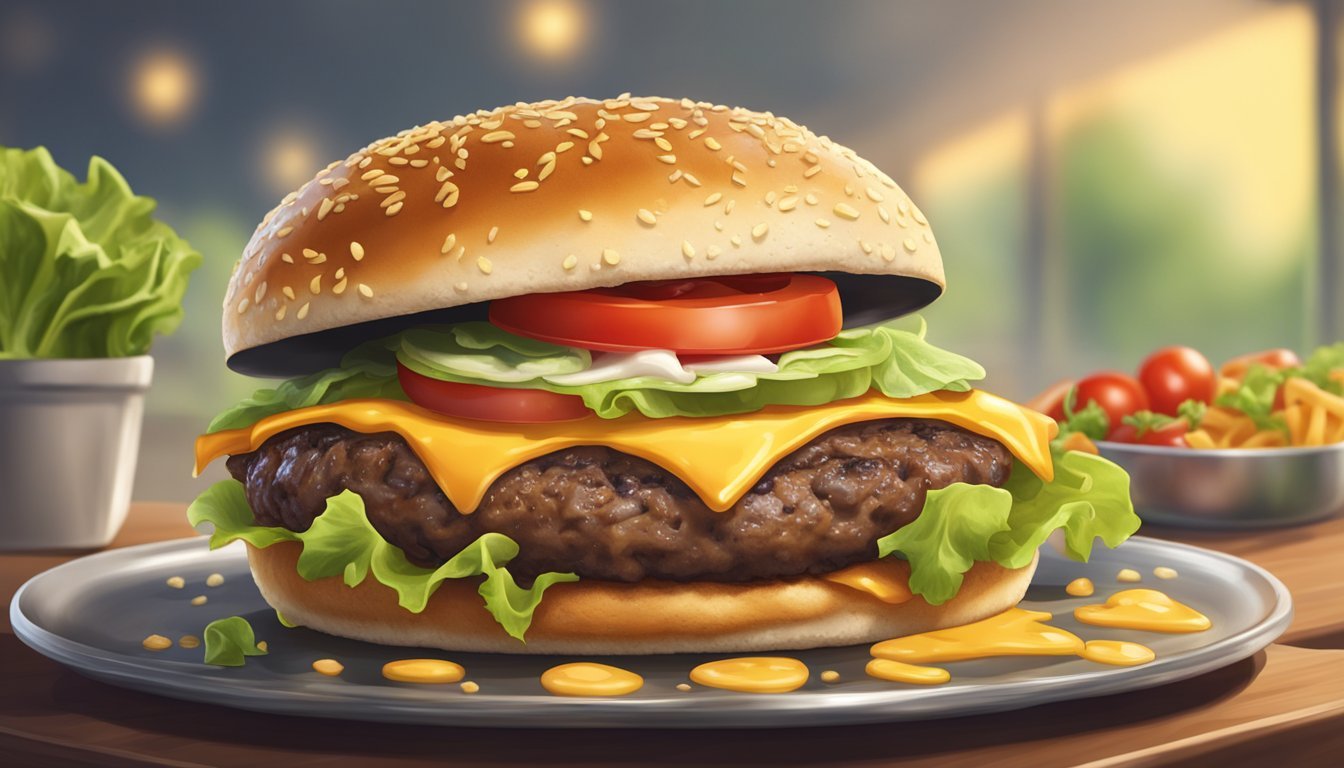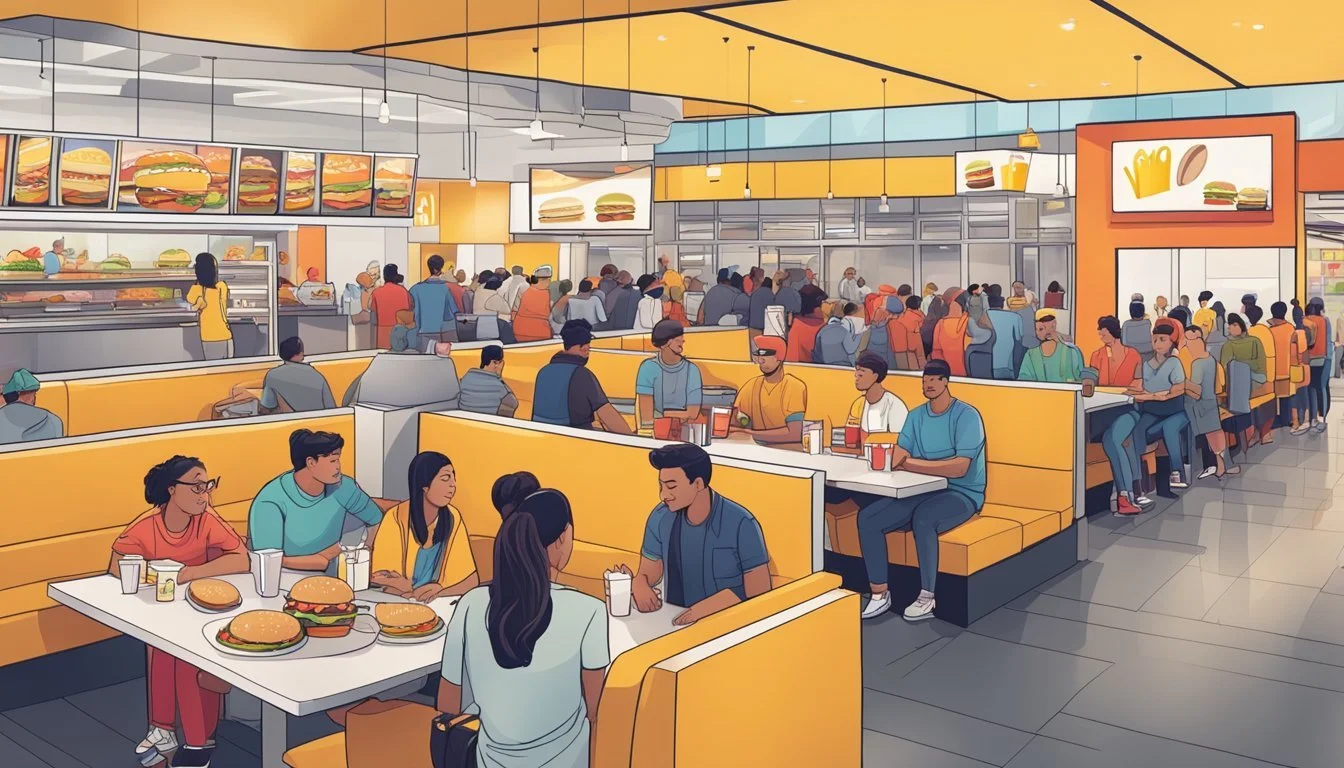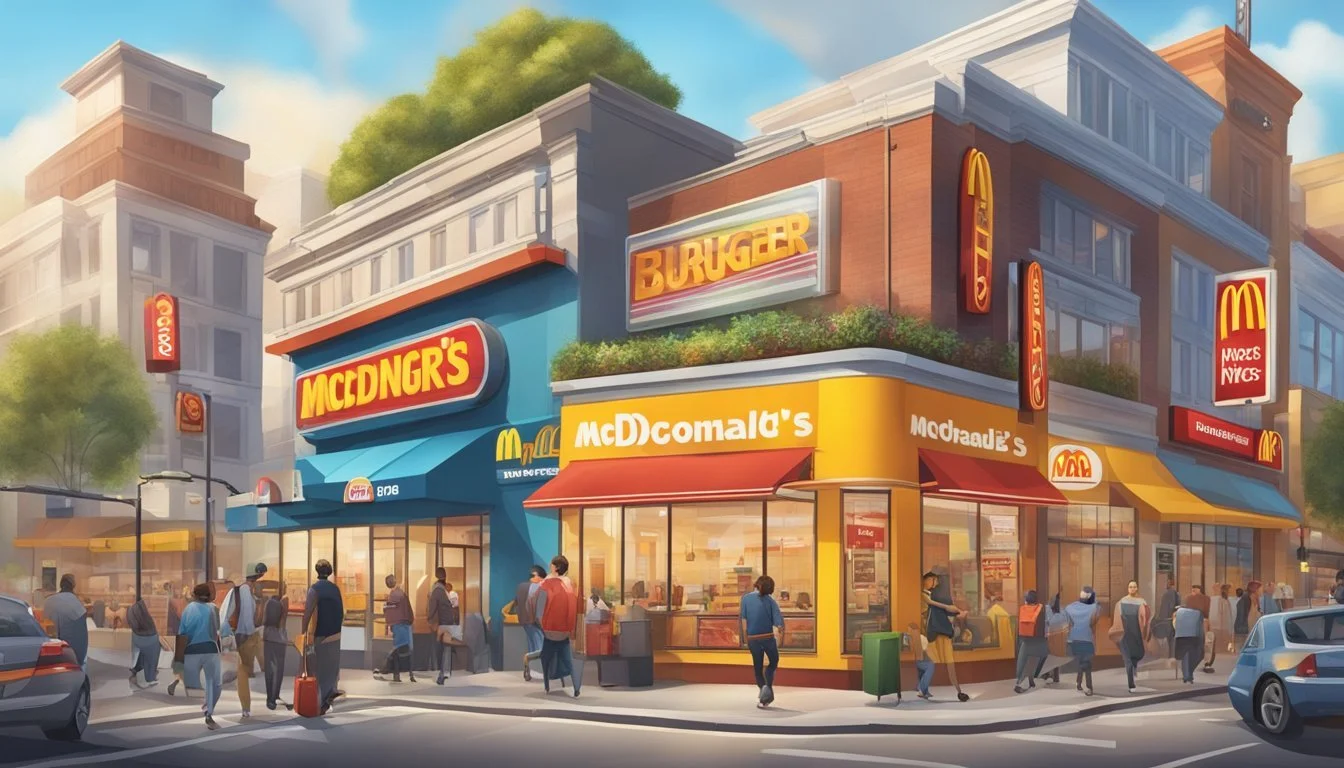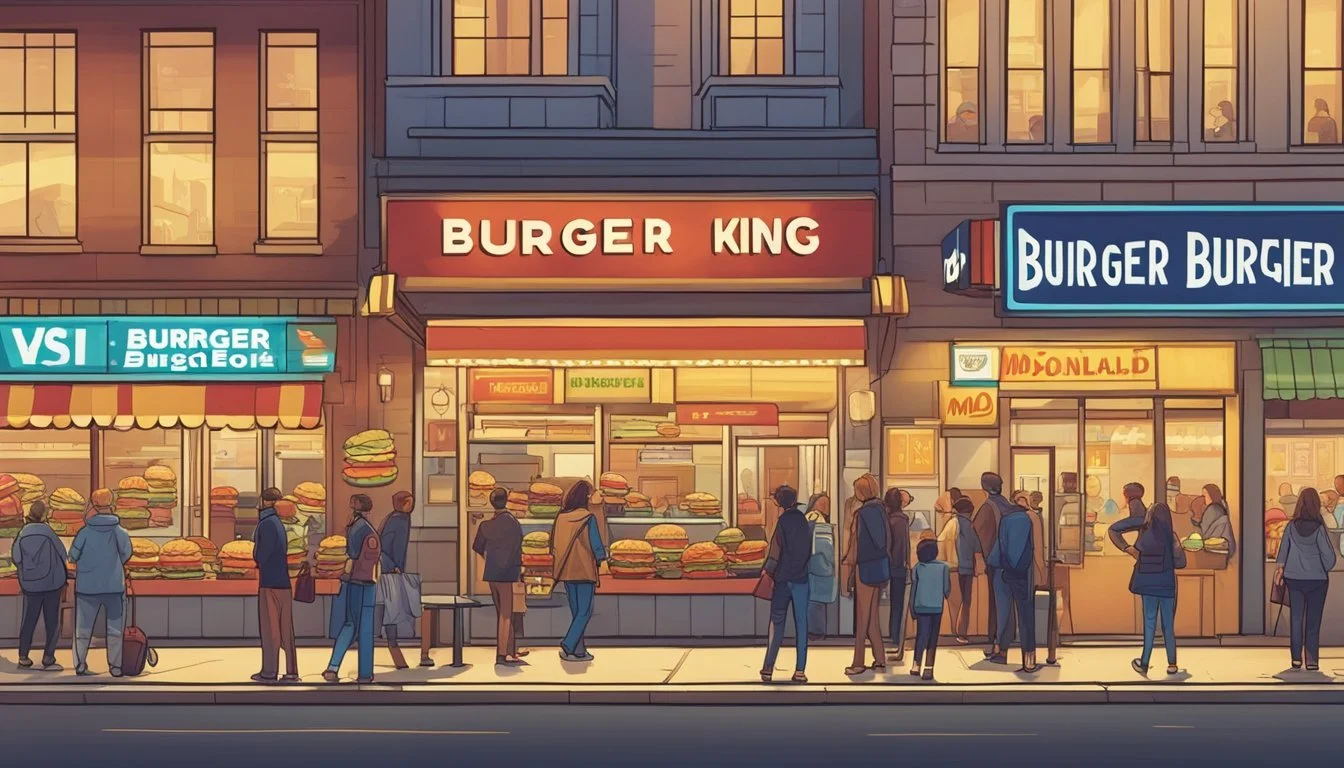McDonald's vs Burger King
An Objective Comparison of the Fast Food Giants
When it comes to fast food royalty, McDonald's and Burger King reign supreme in the battle for burger supremacy. This contest is not just about who crafts the better burger, but encompasses a myriad of factors such as menu diversity, price points, and global sales performance. McDonald's, known for its iconic golden arches, has traditionally led the pack with its globally recognized brand. Its rival, Burger King, also holds a strong position globally with a particularly loyal customer base and its own signature offerings like the Whopper.
Financial performance and market penetration form part of the ongoing rivalry between these two fast-food titans. McDonald’s boasts higher global sales figures, indicative of a larger market presence and possibly more profitability. However, Burger King often presents itself as the budget-friendly alternative, offering competitive pricing on many items such as chicken nuggets and double cheeseburgers, potentially giving it an edge with cost-conscious consumers. The differences between these two chains are not just in their balance sheets, but also in their strategic approaches to menu options and pricing, making the competition between them a dynamic and multi-faceted issue.
Historical Overview
The history of McDonald's and Burger King, two titans in the fast-food industry, reveals a rich tapestry of innovation, strategic franchising, and competitive expansion that laid the foundation for their global presence today.
Origin of McDonald's
McDonald's began as a barbecue restaurant in 1940, founded by brothers Richard and Maurice McDonald in San Bernardino, California. Their business model was revolutionized in 1948 when they introduced the "Speedee Service System," a predecessor to the modern fast-food restaurant. This system focused on efficiency and mass production techniques akin to assembly lines. Ray Kroc, a milkshake mixer salesman, recognized the potential of the McDonald brothers' concept and in 1955 he opened the first McDonald's franchise in Des Plaines, Illinois. Under Kroc's leadership, McDonald's adopted a franchising model that emphasized consistency, standardized processes, and a family-friendly environment.
Rise of Burger King
Burger King's story begins in 1953 with Keith J. Kramer and his wife's uncle, Matthew Burns, who started a burger restaurant in Jacksonville, Florida. They utilized a special grill machine called the "Insta-Broiler" and originally named the establishment "Insta-Burger King." After running into financial difficulties, James McLamore and David Edgerton purchased and rebranded the company to Burger King in 1954. They introduced the flame-grilling method that became a signature of Burger King's identity. Emphasizing taste and portion sizes, Burger King expanded its operations, focusing on franchising as a vehicle for growth, much like its counterpart McDonald's.
These beginnings set the stage for what would become a storied competition that still resonates in the fast-food segment today.
Brand Analysis
In the competitive landscape of fast food, McDonald's and Burger King stand out through their distinct branding and marketing strategies, as well as their significant global reach and market capitalization.
Branding and Marketing
McDonald's branding is renowned for its Golden Arches, instantly recognizable worldwide, symbolizing quick service and family-friendly dining. The company's marketing team has been successful in creating a universal brand appeal, while adapting to regional tastes. Through strategic management, McDonald's has maintained a strong brand image of convenience and ubiquity.
Burger King, on the other hand, has built its brand identity around the Whopper, positioning itself as a provider of bigger, flame-grilled burgers. They often use bold marketing campaigns and have sometimes directly challenged McDonald's, offering a brand that prides itself on individuality and taste.
Global Reach and Market Capitalization
McDonald's Global Reach:
Countries: Over 100
Outlets: 38,000+
Market Cap: ~$190 billion (as of last known data)
Burger King's Global Reach:
Countries: 100+
Outlets: 18,000+
Market Cap: ~$7 billion (acquired by Restaurant Brands International which has a market cap of around $30 billion)
McDonald's has a larger footprint globally, with a market capitalization that dwarfs that of Burger King. This reflects the strength of McDonald's management team and their effectiveness in executing their branding and marketing strategies. Although Burger King has a significant presence worldwide, its market capitalization is indicative of a smaller scale operation relative to McDonald's. The management and marketing efforts by both brands continually drive their expansion and market share.
Core Menu Offerings
McDonald's and Burger King boast iconic menus, each headlined by their flagship sandwiches. These menus have evolved to include a variety of items catering to different tastes and preferences, but they remain distinguished by their signature offerings and side items.
Signature Burgers
McDonald’s is known worldwide for the Big Mac, a double-decker burger distinctive for its special sauce and middle bun. It's a cornerstone of the McDonald's menu and a point of comparison for all other burgers.
Burger King, on the other hand, has the Whopper as its marquee offering. The Whopper is a large, flame-grilled hamburger with a quarter-pound beef patty, often considered the direct rival to the Big Mac in the burger wars.
Sides and Accompaniments
Aside from burgers, both chains provide a wide range of sides and accompaniments.
Fries: Both offer their own style of french fries, with McDonald’s fries being thin, crispy, and widely praised.
Nuggets: Burger King offers a better deal with a 10-piece nugget at a lower price point compared to McDonald's; however, McDonald's Chicken McNuggets are a popular pick known for their consistent taste.
Chicken Sandwiches: Both chains have invested in chicken sandwiches, with various options that cater to preferences for spicy or classic flavors.
Salads and More: Both menus feature a selection of salads and healthier options to complement the more indulgent offerings.
Burger King and McDonald's constantly compete on menu variety, taste, and price points, aiming to satisfy millions of customers daily.
Nutritional Comparison
When comparing McDonald's and Burger King, the nutritional content of their signature burgers often serves as a key point of differentiation for health-conscious consumers. Both chains' burgers provide varying caloric content and ingredient quality which may influence consumer choice.
Calorie Count
McDonald's Hamburger
Calories: 250
Total Fat: 9g
Burger King Hamburger
Calories: 241
Total Fat: 10g
The classic McDonald's hamburger contains slightly more calories than Burger King's counterpart. Burger King's hamburger offers a slightly lower calorie option with a closely comparable fat content. Customers opting for lower calorie meals might lean towards Burger King for a marginal difference.
Ingredient Quality
Both McDonald's and Burger King have made strides to improve the quality of ingredients in their burgers. McDonald's touts the use of 100% pure beef in their patties, without any fillers, additives, or preservatives. In line with this, they emphasize the freshness of their ingredients, promoting their commitment to quality.
Similarly, Burger King advertises their burgers, such as the iconic Whopper, as being made with 100% beef. They also highlight the flame-grilled cooking method, which not only impacts flavor but is a cooking technique that some believe can affect the quality of the burger.
Customer Experience
When comparing McDonald's and Burger King, their approach to customer experience notably differs, particularly in service, value, and customization options that cater to modern fast-food consumers.
Service and Convenience
McDonald's service model focuses on efficiency and speed, often reflecting in their significant investments in technology such as self-ordering kiosks. These kiosks have been pivotal in reducing wait times and streamlining the ordering process for customers, allowing for a more convenient experience. Burger King, while also adopting similar technologies, typically emphasizes promotional deals to enhance value for their customers.
Self-ordering kiosks: Available at most McDonald's, streamlining service
Promotional deals: Frequently offered by Burger King for value enhancement
Innovation and Customization
Burger King often prides itself on offering customers more customization options, allowing them to tailor their meals to their specific tastes. Their "Have It Your Way" philosophy makes burger customization a central part of the customer experience. Conversely, McDonald's innovates with menu diversity and limited-time offerings, providing customers with novel flavors and options.
Burger King customization:
Have It Your Way philosophy
Tailored meal options to customer preference
McDonald's innovation:
Menu diversity with regular updates
Limited-time offerings for new experiences
Pricing and Value
In the competitive landscape of fast food, McDonald's and Burger King constantly adjust their pricing strategies to offer the best value for their customers.
Menu Pricing
Burger King's approach to menu pricing includes competitive offers such as their 10-piece nuggets for $1.49, which stands out against McDonald's higher price point of $4.49 for the same item. However, when it comes to beverages, McDonald's takes the lead with slightly cheaper options across varying sizes. Whereas a Burger King's Whopper is priced at $0.20 more than McDonald's iconic Big Mac. A direct comparison indicates that double cheeseburgers at Burger King are $0.30 less expensive, signaling a tactical pricing advantage for select items at Burger King.
Value Proposition
McDonald's answers to the competitive pricing with its own value proposition, featuring the Dollar Menu, which comprises a range of items priced at about $1, giving customers the ability to construct a meal for a few dollars. Both chains maintain similar costs for their signature burgers with a per-gram pricing that's roughly equivalent, making the overall value offering a matter more of individual preference than price.
Business Performance
When comparing the business performance of McDonald's and Burger King, it's integral to look at specific metrics such as revenue, profit, and the companies' ability to respond to economic challenges. Both brands have experienced fluctuations in sales and profit, reflective of their operational strategies and market adaptation.
Revenue and Profit
McDonald's
Revenue (2021): $23.22 billion
Profit (2021): Data suggests McDonald's profit was significantly higher than Burger King's.
Burger King
Revenue (2021): $1.02 billion
Profit (2021): Burger King earned lesser profit compared to McDonald's.
In terms of sales, McDonald's consistently sees a higher volume, contributing to its larger revenue and profit margins. Their strong performance in these areas indicates effective business strategies and operational efficiency.
Response to Economic Challenges
McDonald's has demonstrated a robust business model that appears more recession-proof, attributed to its affordability and global presence. They have historically weathered economic downturns with steady sales, indicating a level of resilience and adaptability in challenging economic climates.
Burger King, while a smaller corporation, has also shown the capacity to endure economic hardships but has faced steeper declines in profit, like the 40% fall in 1986. Their response to economic challenges is critical in maintaining market competitiveness and involves strategic marketing and operational adjustments to stabilize sales and revenue.
Both companies have had to navigate the complex landscape of the fast-food industry, adapting their strategies to maintain and improve their business performance amidst varying economic conditions.
Consumer Perception
When it comes to McDonald's and Burger King, consumer perception is shaped by a mix of public surveys and social media sentiment. This perception reflects not only the taste of the food but also the customer satisfaction levels and brand loyalty.
Public Surveys
Surveys conducted across various demographics often shed light on customer preferences between these two fast-food giants. For instance, McDonald's typically scores higher in terms of brand recognition and customer satisfaction, attributable to their extensive global footprint and consistent product offerings. On the other hand, Burger King sometimes edges out with better perceived value in specific categories, like their nugget deals which are generally priced lower than McDonald's.
A significant aspect to consider from survey results is brand loyalty. McDonald's loyal customer base is attributed to the consistent experience it provides, while Burger King's loyalty often revolves around unique offerings such as the flame-grilled taste of their burgers.
Social Media Sentiment
Social media offers a real-time view of how consumers feel about McDonald's and Burger King. Through sentiment analysis of posts, tweets, and reviews, one can gauge the public's current favor.
McDonald's often highlights new menu additions or collaborations which generate positive buzz.
Burger King's promotions and campaigns can spur a significant amount of online discussion and engagement, though not always positive.
On platforms like Twitter and Reddit, users might express a preference for the taste of Burger King's Whopper over McDonald's Big Mac, while others praise the convenience and ubiquity of McDonald's locations. It's a testament to how both brands have carved out distinct niches in public opinion.
Competitive Landscape
In the fiercely contested fast-food industry, McDonald's and Burger King distinguish themselves through unique marketing strategies, diverse product offerings, and specific branding efforts. They not only battle each other but also strive to stand out among other prominent chains.
Comparison with Other Fast-Food Chains
McDonald's, traditionally the industry leader in the fast-food sector, faces stiff competition from a variety of significant players. These competitors include Wendy's, known for its square burgers and fresh ingredients, Five Guys with its customizable burgers and conspicuous focus on quality, In-N-Out, which markets simplicity and a commitment to freshness, Chick-fil-A with a strong emphasis on customer service and specialty chicken offerings, and Shake Shack, highlighting its modern "fast-casual" dining experience.
Subway, despite a contrasting offering of submarine sandwiches, competes in the convenience and widespread availability stakes.
Taco Bell contrasts the burger-centric menus with its Mexican-inspired foods.
Checkers, though smaller, provides value offerings that appeal to cost-conscious consumers.
Starbucks, predominantly a coffeehouse, indirectly competes for breakfast and snack occasions with its sandwich options and broad beverage line-up.
Market Differentiation
To maintain a competitive edge, McDonald's and Burger King have adopted distinct market differentiation strategies. McDonald's leverages its global reach and omnipresent brand, with a focus on consistency and the cultural adaptation of its menu.
McDonald's
Differentiation Factor: Global reach, consistent experience
Burger King
Differentiation Factor: Flame-grilled burgers, Whopper customization
Burger King differentiates itself with its signature flame-grilled cooking method and the ability to customize the flagship Whopper. In contrast, Five Guys differentiates with burger customizations but with a different array of toppings and more upscale positioning. Meanwhile, Chick-fil-A specializes in the chicken sandwich domain and highlights its customer service. Taco Bell stands apart with its bold flavors and value menus.
Fast-food chains have to consistently refine their strategies to appeal to changing consumer preferences, maintain brand loyalty, and capture new markets in an industry where taste and convenience are paramount.
Environmental and Social Responsibility
McDonald's and Burger King have both recognized the importance of sustainability and corporate social responsibility within the fast-food industry.
McDonald's has taken steps to address environmental concerns, particularly in its supply chain. They have announced efforts to eliminate antibiotics from their global beef supply. This move reflects a growing commitment to animal welfare and public health. Additionally, McDonald's is exploring plant-based menu options, partnering with companies like Beyond Meat, to provide alternatives to traditional beef patties.
Burger King is also making strides in sustainability, focusing on reducing its carbon footprint. They have introduced initiatives to implement more sustainable packaging solutions. Items such as Whopper wrappers and Frypods are being redesigned with environmental considerations in mind. Moreover, Burger King has been testing the meatless "Impossible Whopper," catering to vegetarian preferences and reducing reliance on meat products.
Both companies have adopted strategies to respond to consumer demand for environmentally-friendly practices. They are:
Innovating in product offerings: Plant-based alternatives are in testing and deployment to reduce environmental impact.
Revamping packaging: Efforts to use materials that are either recyclable or have a lower carbon footprint are underway.
Supply chain management: Steps are being taken to ensure more ethical sourcing and production, including addressing the use of antibiotics in beef.
These actions reflect the fast-food titans' acknowledgment that sustainability and corporate social responsibility are essential to their long-term business strategies and public image.

